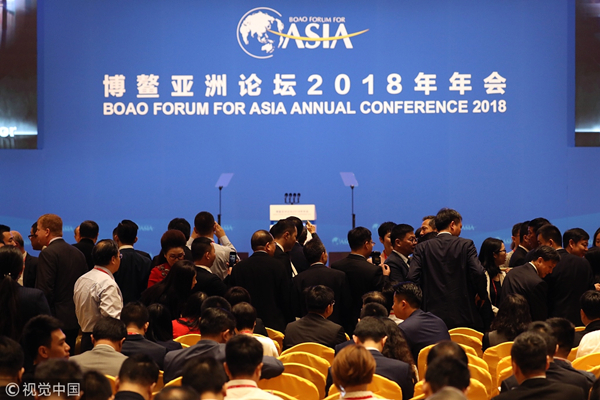
The opening ceremony of the Boao Forum for Asia annual conference is held in Boao, Hainan Province, April 10, 2018. [Photo/VCG]
After Chinese President Xi Jinping's speech at the Boao Forum for Asia Annual Conference 2018 on April 10, leaders of other Asian countries and heads of international organizations voiced their support for interconnectivity, free trade and fair globalization.
President of the Republic of Philippines Rodrigo Roa Duterte noted the global shifting of economic weight and might to Asia while it continues its comparatively robust growth in the following decade. "Every Asian country, big or small, has a role to play" for prosperity and peace, he told the forum.
Yet the economies will encounter challenges ahead. "But we will not be deterred. We seek to partner with responsible businesses – homegrown and foreign based – to drive the progress we envision," Duterte said while making his speech at the opening of the forum.
Duterte said the Philippines remains committed to interconnectivity, innovation and investment.
"We will continue our efforts to broaden and deepen our economic engagement and cooperation with our friends and neighbors. We must harness the potential for shared growth in our region and beyond," he said.
"As sovereign equals, the Philippines and China are partners in the building of much-needed infrastructure," he stressed. "We are bridging bridges of greater understanding between our people. We are working together on strengthening economic complementarities."
"Let me say it again today: the Philippines' destiny is in Asia. The Philippines is ready to work with all nations in the region who seek friendship and cooperation," he said.
Pakistan Prime Minister Shahid Khaqan Abbasi is concerned that "the trading regime underpinned by the WTO is eroding".
"As nations look inward, and turn their backs on globalization, we in Asia confront a strategic choice: Whether to follow suit, or to script an alternative, more hopeful vision for our future," he told the forum.
"Our coordinated and tailored approaches must incorporate the enterprising spirit of our people and their common aspirations for a better life. They must include embracing structural reform, strengthening regional institutions, increasing connectivity, leveraging technology and investing in human capital."
Abbasi said today China is a global leader in addressing climate change and in promoting global trade, equitable development and a sustainable world.
Lee Hsien Loong, prime minister of the Republic of Singapore, emphasized concerns over the impact of high tariffs for countries big and small.
"Singapore does not believe that imposing unilateral tariffs is the correct solution" as they are not compliant with the World Trade Organization's (WTO) rules.
There will always be competition between major powers, but it makes all the difference whether competition occurs within a framework of interdependence and generally accepted rules of the game, Lee said at the Boao Forum for Asia Annual Conference.
More fundamentally, as economists point out, the focus on the bilateral trade imbalance between the US and China is misplaced, he said. "What matters to a country is not its bilateral trade balance with a specific trading partner, but its overall trade balance with the rest of the world. Furthermore, the cause of a trade deficit is an imbalance in the domestic economy, in particular when a country consumes more than it produces."
Lee also said that China has responded to the United States' trade salvos accordingly and is "careful and calibrated".
"Nevertheless, there is now a serious dispute. Everyone still hopes that before these tariffs are implemented, the two countries will be able to work out an accommodation and head off further escalation," he added.
Prime Minister of Mongolia Ukhnaagiin Khurelsukh said at the forum that openness and connectivity are conducive to healthy economic development.
Secretary-General of the United Nations Antonio Guterres said at the forum that globalization has brought benefits, but the goal should be "fair globalization that leaves no one behind".
"One thing must be very clear: We won't make globalization fair by isolationism, protectionism or exclusion," he told the forum. "Global problems need global multiple solutions." Multilateral connectivity and cooperation should be emphasized so as to achieve peace, dignity and prosperity for all mankind.
Managing Director of the International Monetary Fund Christine Lagarde also identified the importance of Asia to global economic growth. She articulated the emphasis on economic openness to the Boao audience.
Also speaking at Tuesday's opening of the Boao forum are President of Austria Alexander Van der Belle, Prime Minister of the Kingdom of the Netherlands Mark Rutte, and Vice-Chairman and CEO of SABIC Yousef Abdullah Al-Benyan. Yasuo Fukuda, chairman of the Boao Forum for Asia, addressed the session at its beginning.